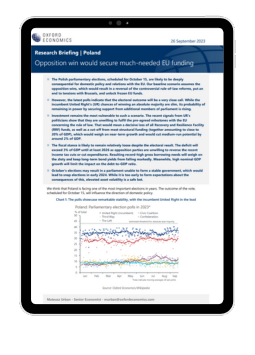Opposition win would secure much-needed EU funding

The Polish parliamentary elections, scheduled for October 15, are likely to be deeply consequential for domestic policy and relations with the EU.
What you will learn:
- However, the latest polls indicate that the electoral outcome will be a very close call. While the incumbent United Right’s (UR) chances of winning an absolute majority are slim, its probability of remaining in power by securing support from additional members of parliament is rising.
- Investment remains the most vulnerable to such a scenario. The recent signals from UR’s politicians show that they are unwilling to fulfil the pre-agreed milestones with the EU concerning the rule of law.
- The fiscal stance is likely to remain relatively loose despite the electoral result. The deficit will exceed 3% of GDP until at least 2026 as opposition parties are unwilling to reverse the recent income tax cuts or cut expenditures.
- October’s elections may result in a parliament unable to form a stable government, which would lead to snap elections in early 2024.
Tags:
Related Posts

Africa Watchlist 2025 – GDP booms, fiscal downfalls, and elections
Our Watchlist 2025 unpacks the likelihood of a South African economic boom and Kenya falling off a fiscal cliff. We also discuss political upheavals in Egypt and the Horn of Africa, and highlight a few more potential election surprises
Find Out More
Perception versus reality for US DOGE
The creation of the Department of Government Efficiency (DOGE), along with the incoming Treasury secretary's goal of halving the deficit as a share of GDP, lend downside risk to our baseline forecast for federal spending.
Find Out More
Metro-level implications of a second Trump administration
The three major policy proposals planned for the second Trump administration—expansionary fiscal policy, lower immigration, and tariffs—will have mixed implications for the US economy over the next few years, and the impacts on metro areas will vary significantly.
Find Out More
France on the brink drives spreads to crisis highs
The spread between French and German government bonds has reached its highest level since the height of the eurozone sovereign debt crisis in 2012, as Prime Minister Michel Barnier's government appears increasingly likely to be toppled over the 2025 budget.
Find Out More